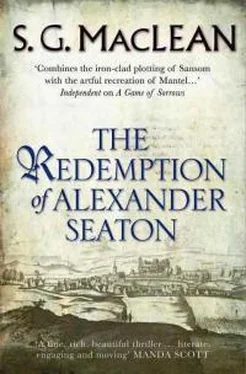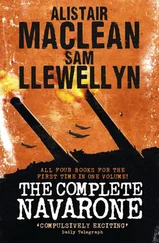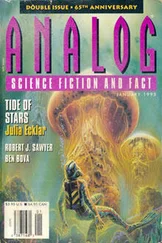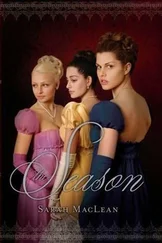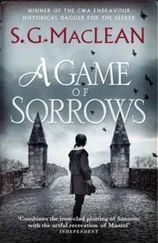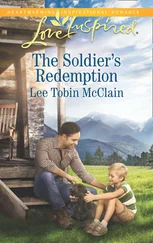Tonight though, Banff was a town without minister or session clerk; the town serjeants and all their men needed every resource for the guarding of the prisoners dispersed over town. All the provost’s care and attention was taken up this night on preventing the unravelling of his young wife’s mind and the utter collapse of her spirit. There was only the baillie, but the baillie, like me, was waiting, watching for what was surely to come. After a hesitant glance at William Buchan, which drew no response, Charles took up his fiddle and let fly with the opening notes of the favourite, ‘Gallua Tom’. The piccolo took up the challenge, and the two, with the tabor beating out their time and the cittern struggling to keep pace, flew against one another in speed and dexterity as in battle joined. The courtyard became a mass of bodies, heaving, whirling, laughing, flinging one another across the floor. The flickering light of the torches played upon their writhing forms, catching the glistening beads of sweat that trickled down their foreheads and the glinting, shining, eager eyes, the lascivious, open mouths.
And then, as the music reached its height and the dancers could scarcely keep pace with the playing, there came looming, crashing into my view the massive form of George Burnett, master stonemason, tormentor of Sarah Forbes and father of her child. Being flung on his arm, a look of terror on her face, was Ishbel. My stomach lurched. I stepped forward to grab the girl, but they had gone whirling past and I was knocked and cursed out of the way by oncoming dancers. Where was the doctor? I looked round but could not see him. I looked after George Burnett and Ishbel, but they had been carried on the tide of the dance and I had no hope of reaching them until they came back round to me. I caught a glimpse of the huge, gnarled fingers on the girl’s slender arm, and I thought of those same hands roughly forcing Sarah Forbes. And yet she had not been crushed, she had not been destroyed, and now she and her child would be safe in Aberdeen, away from him. But Ishbel, no, Ishbel had not that strength. She would be crushed by him like a flower beneath his feet, and it would kill the doctor. A crushed flower, a broken, fallen, flower. And then I saw it, as the music threatened to carry all with it in a whirlwind of madness and swirling bodies. As the strange-scented smoke again snaked towards me I saw the flowers falling to the floor, falling from an open hand, and I saw the face of the woman who had once held them. She called to me through the music, through silence, through time. Janet and Mary Dawson had heard it wrongly, for Patrick Davidson had not said ‘James and the flowers’ at all.
I began to push and crash my way through the crowd. The music was now disjointed, discordant, and faltered to a stop as Charles Thom leapt from the stage bellowing at George Burnett to leave off his hold on the girl. On another night, at another time, I would have been there with him, but now I could but commit him and Ishbel to God and to each other. There was other work of the stonemason’s I must see to tonight. A group of tanners and dyers, laughing, drinking, blocked the entrance to the vennel leading back out onto the street. Feeling sick, I tried to ask them to let me pass, but the words fell disordered from my mouth. ‘Falling down again, eh, Mr Seaton?’ Their laughter was less derision than amusement.
‘I need to get past,’ I said.
‘Not before you take a cup with us.’ A voice I did not know was joined by a hand I could not rightly see. A cup was pressed on me, its contents burning with heat and spices. I drank quickly, but a dancer hurled from the floor slammed into my back and most of the warm liquid was spilled down my front. More laughter, and the craftsmen parted to let me by. I stumbled through the vennel and out into the open street, the noises of the lykewake following me into the clear night. Men and women, shapes and shadows, emerged from corners, fell back against walls, slipped down dark pends and vennels, all having forgotten the business of the night, the burned and blackened corpse of a murdered girl.
Curses and shouting and noises of commotion followed me into the street; I turned around in time to see George Burnett, oaths flowing from his mouth, be bodily ejected from the apothecary’s pend, Thomas Stewart behind him warning him not to come back. I slumped into a doorway to let the stonemason pass, swaying on unsteady feet, blood coursing from his nose. Charles had had the better of it and Ishbel would be all right, thank God. Burnett caught a glimpse of me just before he reached the door of the Market Inn. Uttering another curse he pushed through it, and the music from the lykewake streamed into the night as the door banged shut behind him. I had scarcely the strength to stand now, and would have been no match for him, drunk though he was.
Over in the kirkyard all was dark and silent: no Dawson sisters now, or ever again, to call to me, or to give aid to a fallen stranger. Clouds passed from the face of the moon and the houses of the burgh stood like crooked sentinels in its light. The way was clear ahead of me and I did not have the option tonight of choosing any other. My throat was dry and beset by a raging thirst; only a supreme effort kept me from diverting my steps to the schoolhouse well, not so far away now. I forced one foot in front of the other, and somehow, nauseous, shivering, I began to drag myself along High Shore, and towards the Water Path. I glanced again at the kirkyard: bricks and mortar motionless for hundreds of years slowly began to shift and sway before my eyes. Headstones, large, small, flat, jagged to the ground, began to dance: I saw the headstones dance. Terror gripped me and I hastened my steps, but I too was swaying, hardly able to keep myself from falling over onto the swirling ground beneath my feet. The strains of music from the lykewake followed me but lost their tune, became discordant and then a cacophony of screeching the further up the path I progressed. They were joined, I knew it, by a wailing that was not of this life or this world. I dared not look back again at the kirkyard.
The street narrowed as I ascended Water Path. The house frontages were narrower, the buildings closer together. Twisting alleyways ran off from the street into yards and backlands and emerged further on having met and crossed others. Any man – or woman – could shadow my path, to overtake me, without being seen by me from the street. Away from the heat and the clamour of the lykewake, the intoxication of its sounds and aromas, of the music and the smoke, my mind was alive to all the terrors of the night. My throat burned in desperation for a drink, but to stop now, to turn back, would be death. I knew that. I could only look ahead, but nothing was as it should have been; nothing was as I knew it to be. Where there were two steps I saw four, moving away and coming closer together. Where I knew there to be only one door, I saw two, banging in unison in a wind that did not blow. I wanted to shut my eyes, to shut out these visions, and look ahead at the one vision I knew to be true, the vision of Helen’s face. It stayed with me. I fixed the eye of my mind on hers and held her there as I forced myself on, as she led me on towards the end of her story. At last I reached my goal, just before the Water Path joined with the Castlegate, just before I came upon the high walls of the castle grounds. The breath and the eyes of the shadows were closer behind me now; I could feel their coldness on my skin. I turned, stumbling, into an opening in the half-crumbled wall to my left and found myself surrounded by the rubble and the foundations of the minister’s new manse.
I had no lantern, torch or candle with me, and the great oaks and horse chestnut trees, just coming into bud as they were, let through only dappled partings of the moon’s light. It was much darker here than it had been out on the street. The sound of the wind in the trees echoed that of the sea returning to the shore; noises of my fellow man from the town below were but a distant memory and murmur. This was a desolate place, too full of ghosts. Their fingers were in my hair. Shaking them loose, I scrambled over stones and trenches to the area where, as Sarah Forbes had told me and as the notary’s discussion with George Burnett had confirmed, the old garden had not yet been cleared. Helen’s garden. There, in the far corner, beneath a wall, sheltered from the sea, the ground had scarce been disturbed; a chorus of deathly voices in my head whispered that this was the place. I stumbled over a branch and only just managed to right myself before my foot went into the trench. I cried out, but no sound came; my mouth, my tongue moved, but all in silence, powerless. No one would hear my cries: a just revenge for Patrick Davidson.
Читать дальше
